Dogs and cats are undoubtedly the most popular pets in the U.S., capturing the hearts of many households (44.5% and 29%, respectively). But various other species manage to find their way into our lives, including what are known as exotic pets — and rabbits fall into that category.
When someone decides to adopt a pet rabbit, they often overlook the level of care these little hoppers require. Rabbits have their own unique needs; their teeth, for example, demand special attention and could even require vet intervention.
Besides, they are naturally curious little guys and love exploring their surroundings, so it can help to have your fluffy bunny covered with rabbit insurance.
Given the popularity of dogs and cats, it is rare for pet insurance companies to extend their coverage to include rabbits. There is only one provider that does. However, there are some other alternatives also worth considering.
This article will examine the available insurance plans, wellness programs and even credit cards designed to tackle those unforeseen veterinary expenses.
So, fellow bunny lovers, let’s dive in. Below you’ll find our three favorite plans and the standout features for each one.
The 3 Best Rabbit Insurance Plans
| BEST OVERALL | BEST ROUTINE CARE OPTION | BEST CREDIT CARD | |
| Nationwide | Pet Assure | CareCredit | |
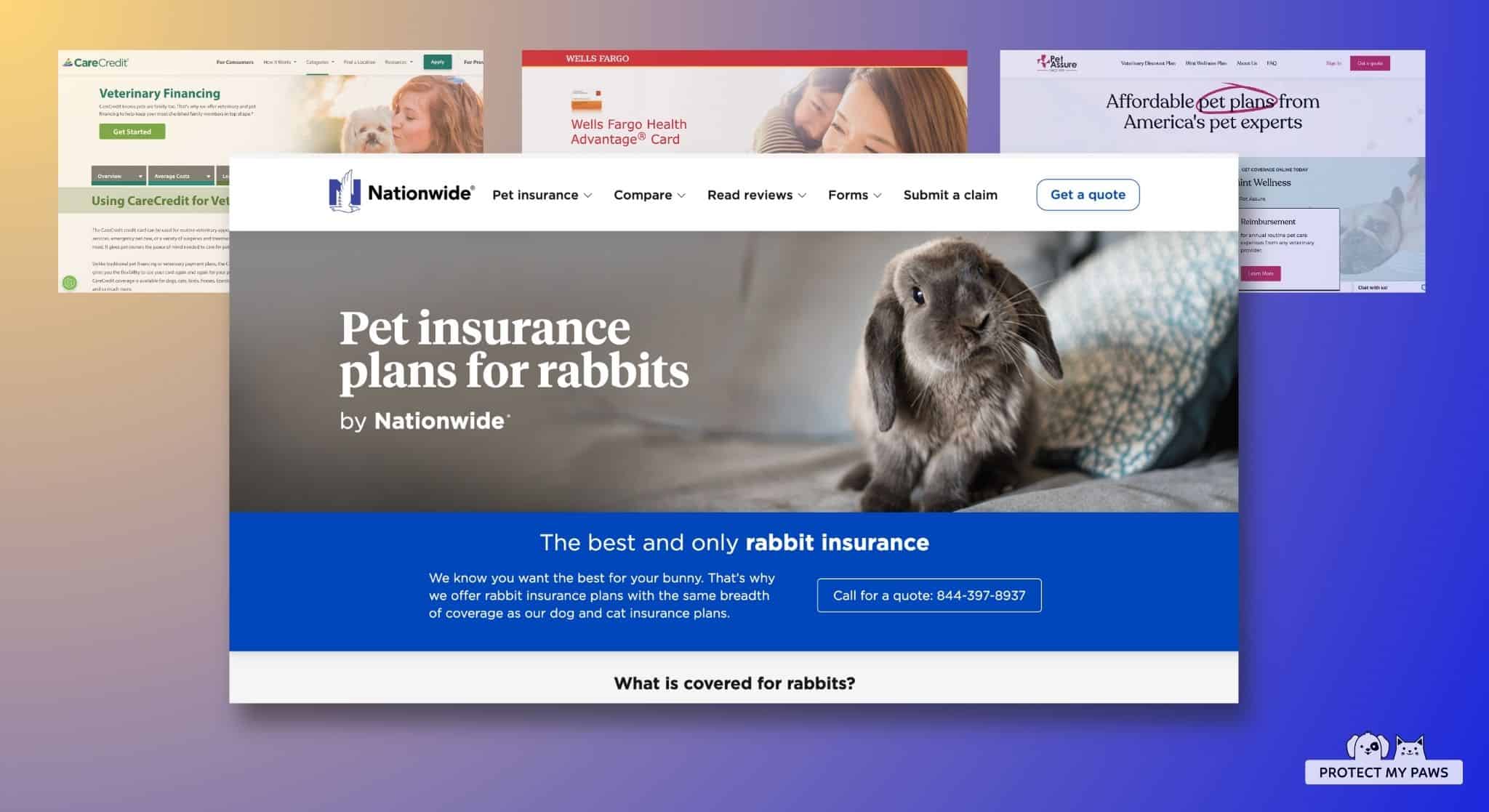 | 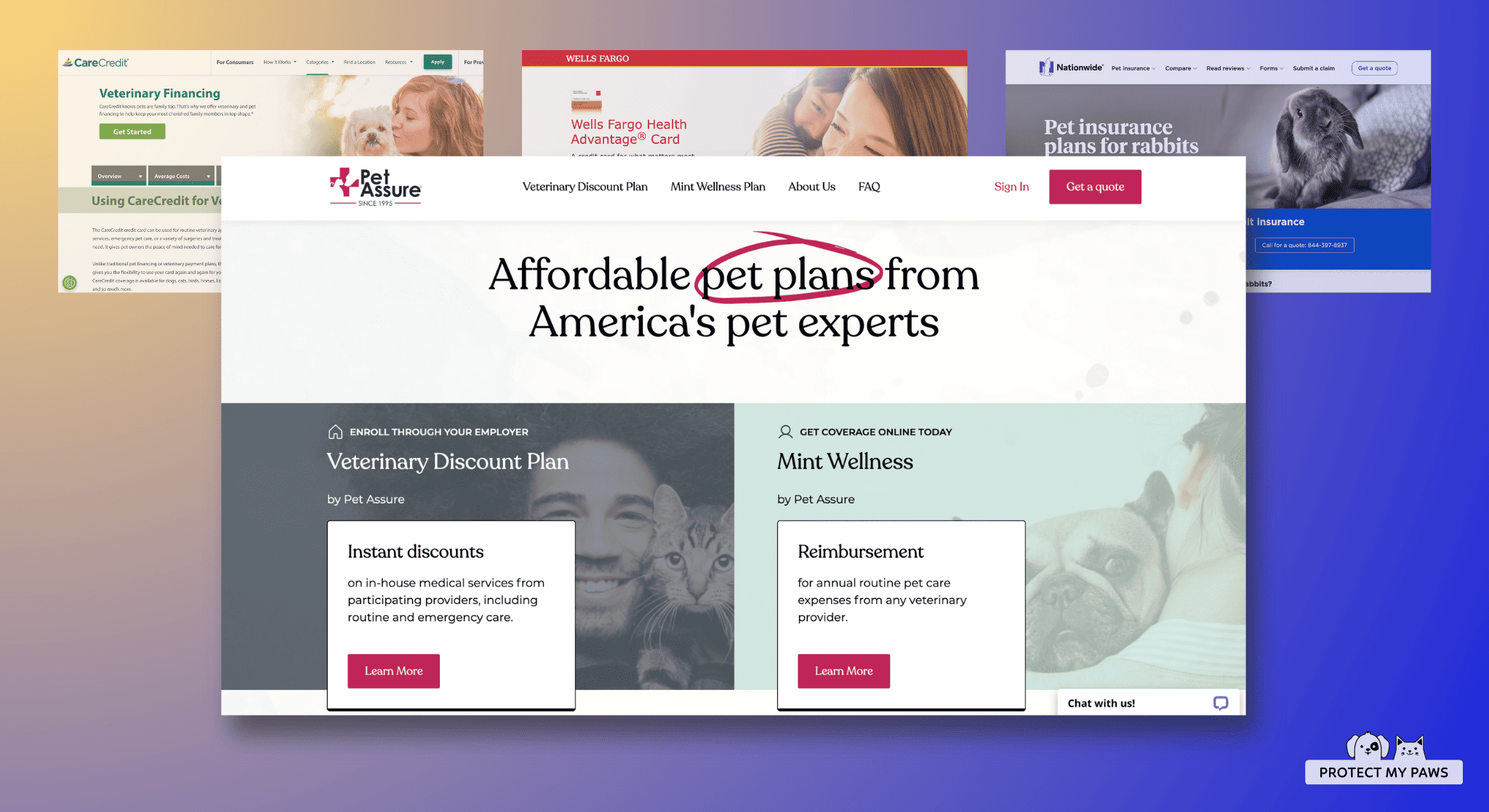 | 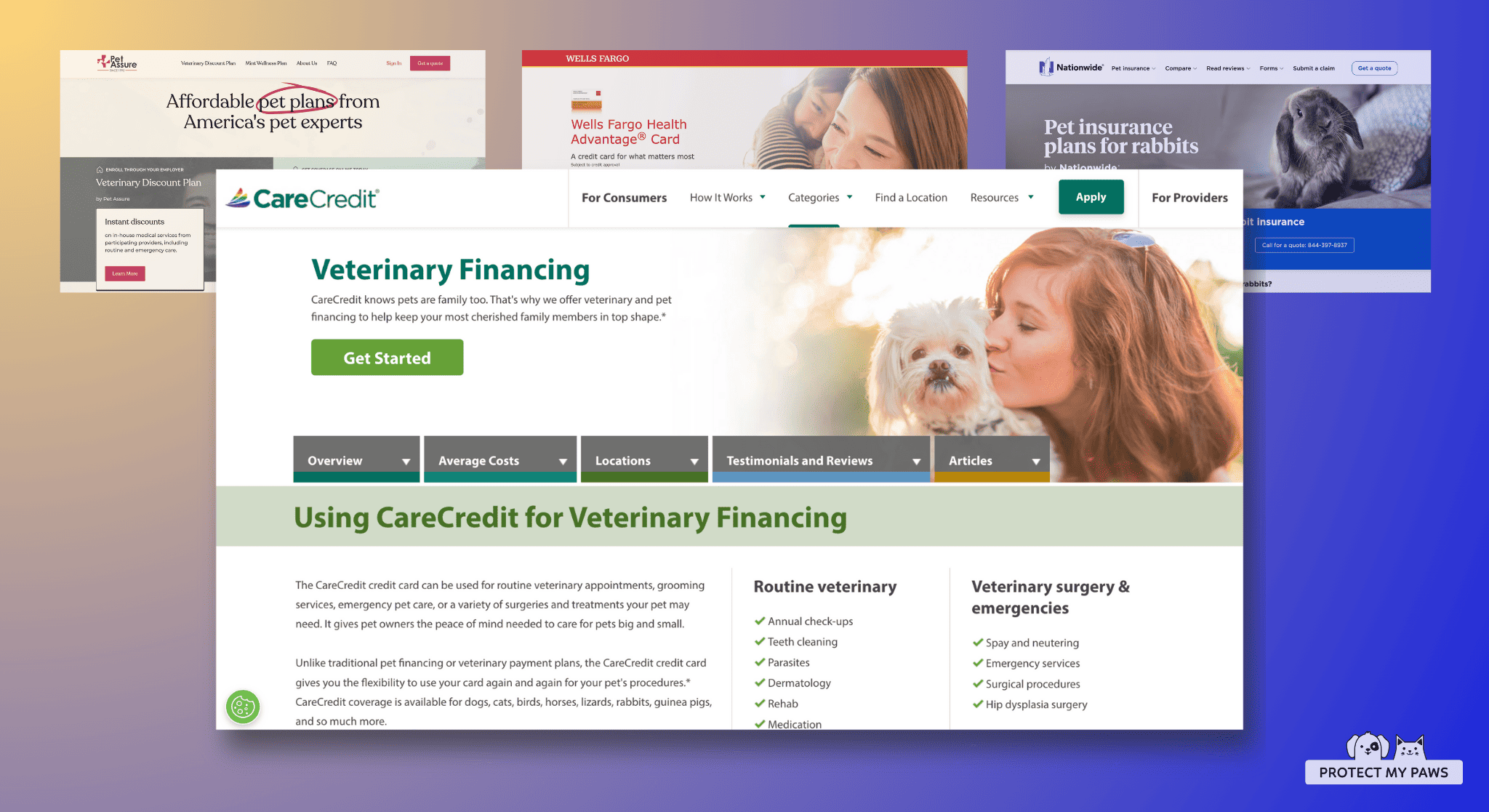 | |
| Insurance Type | Accidents and illness | Wellness | Credit card |
| 👍 Pro | Comprehensive coverage with traditional insurance plan | Coverage begins as soon as you enrol | Smart way to pay for unexpected and out-of-budget vet costs |
| 👎 Con | No wellness add-ons currently available for exotic pets | The Veterinary Discount plan is limited to vets in-network | Not all vets accept CareCredit as a payment option |
| More Info | Nationwide has over two decades of experience with rabbit insurance | Mint Wellness plans include a Lost Pet Recovery Service and an ID tag | CareCredit also offers financing options for personal procedures, such as dentistry and cosmetics |
| Deductible | $250 | N/A | N/A |
| Reimbursement | 50% – 70% | N/A | N/A |
| Annual Limit | $10.000 | Veterinary Discount Plan: No annual limits Mint Wellness Plans: Basic: $350 Essential: $650 Premium: $ 1.100 | Not applicable |
So now you have the standout features of our top choices.
But insurance and health coverage can be tricky to wrap your head around. That’s why we’ve got you covered with a detailed analysis below. It breaks down each option for rabbit coverage, so you can make an informed decision that’s just right for you and your fluffy friend.
1. Best Option Overall: Nationwide
Nationwide is one of the oldest and largest pet insurance providers in the U.S., well known for its extensive experience in the insurance industry. It is the only provider in the country offering insurance coverage for exotic pets.

Their insurance plans are carefully tailored to address the unique needs of each species they cater to. In the case of rabbits, the coverage extends to common conditions like overgrown teeth and intestinal obstruction. Other covered illnesses include eye and bladder infections and upper respiratory issues.
The Whole Pet plan reimburses customers for up to 70% of veterinary expenses, including examinations, hospitalization, lab fees, prescriptions, X-rays and more.
Filing a claim is a straightforward process and can be submitted online or by downloading the form and sending it via email, fax, or mail. Plans can be easily canceled anytime, so you also have flexibility.
What We Really Like:
👍 The VetHelpline, an on-demand app offering expert veterinary advice available 24/7
👍 With the PetRxExpress, policyholders can get preferred pricing on pet prescriptions
👍 Cured pre-existing conditions may be covered upon request
👍 Multi-pet discount: 5% discount for households with two or three pets, 10% for homes with four or more pets.
What We Think Could Be Better:
👎 Wellness coverage is not currently available for exotic pets
👎 Pet parents must call Nationwide directly to get a quote; it cannot be obtained online
| Customer Review “My experience with Nationwide Pet Insurance has been absolutely outstanding. Filing claims is easy and they have been very fair in settling the claims. We’re are on our fourth year with them.” — Jack H. (Google Reviews) |
PLAN BREAKDOWN
| ProtectMyPaws rating: | ★★★★★ |
| Insurance type: | Accidents & Illness |
| Accident & Illness: | ✔️ |
| Dental: | ✔️ |
| Routine care (vaccinations etc): | ❌ |
| Pre-existing conditions: | ❌ Not covered |
| Age limits: | Pets must be at least 8 weeks old at the time of application, but there is no maximum enrollment limit. |
| Reimbursement time: | 5 days |
| Cancellation policy: | Available at any time by notifying Nationwide in writing or online |
| Deductible: | $250 annual deductible |
| Reimbursement rate: | 50% and 70% |
| Annual limit: | $10.000 |
2. Best for Routine Care: Pet Assure
Pet Assure provides a unique alternative to traditional pet insurance through its Veterinary Discount Plan, which offers savings directly at the vet’s office. Additionally, they have a wellness program called Mint Wellness. The first has been around since 1995, while the second was introduced in 2023 for additional benefits and overall coverage.
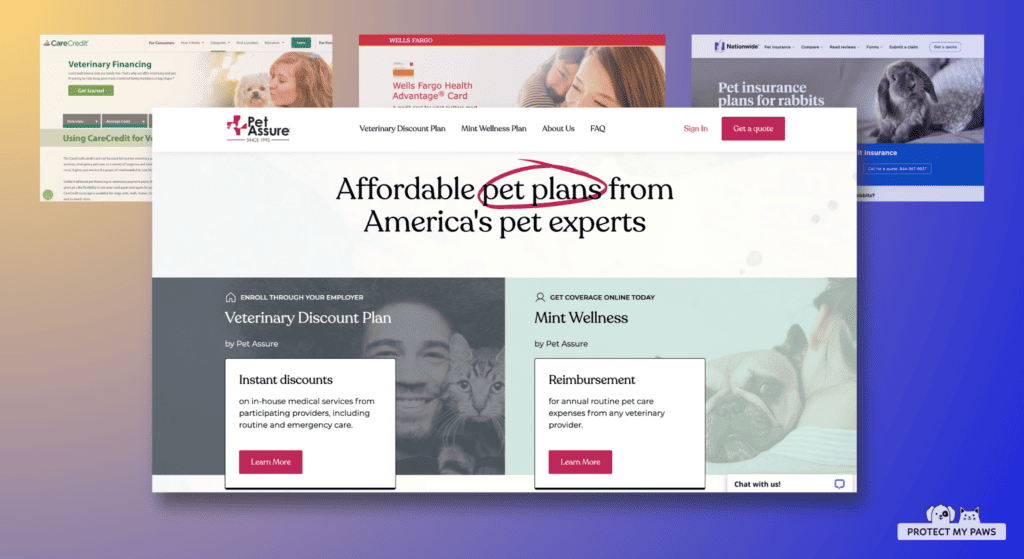
On the Veterinary Discount Plan, customers pay a monthly fee and receive a 25% discount on all their in-house vet services upon presenting the ID card. The discounts can be used for various medical services and procedures, including dental care, spaying and neutering, routine check-ups, vaccinations, hospitalization, surgical procedures and allergy treatments.
| ⚠️ Pet Assure works with a network of participating veterinary providers and you can only get a discount from a veterinarian who participates in their network. |
The Mint Wellness plans reimburse for routine pet care services after paying the full amount at any veterinarian’s office. This covers wellness visits, vaccinations, bloodwork and a Fecal Test or Urinalysis. The Premium plan also includes grooming, preventatives and dental care. Unlike the Discount plan, customers can visit any veterinarian and receive reimbursement, as Mint Wellness plans are not limited to participating providers.
What We Really Like:
👍 Plan coverage effective immediately
👍 Covers pre-existing and hereditary conditions
👍 Has dental coverage
👍 Online database to search for veterinarians participating on the Discount Plan
What We Think Could Be Better:
👎 The Veterinarian Discount plan can’t be purchased directly, as it is offered as an employer-sponsored benefit
👎 The discount plan is limited to vets in-network
| Customer Review “Caring, friendly and courteous customer service keeps me a satisfied customer since 2014! Let’s not forget the 25% savings on in-house vet care medical services.” — Joan P. (Google Reviews) |
PLAN BREAKDOWN
| ProtectMyPaws rating: | ★★★★☆ |
| Insurance type: | Routine care & Veterinary Discount |
| Accident & Illness: | With the Discount Plan |
| Dental: | ✔️ |
| Routine care (vaccinations etc): | ✔️ |
| Pre-existing conditions: | ✔️ |
| Age limits: | ❌ No age limits |
| Reimbursement time: | 5 business days |
| Cancellation policy: | By the end of the Plan Contract term. Mid-term cancellations may result in a fee. |
| Deductible: | N/A |
| Reimbursement rate: | N/A |
| Annual limit: | Veterinary Discount Plan: No annual limits Mint Wellness Plans:Basic: $350Essential: $650Premium: $ 1.100 |
3. Best Insurance Credit Card: CareCredit
With few rabbit insurance options out there to choose from, a health credit card can be a handy alternative to deal with unexpected vet expenses. CardCredit is a credit card issued by Synchrony Bank that helps pet parents create a payment plan for unexpected medical or veterinary costs.
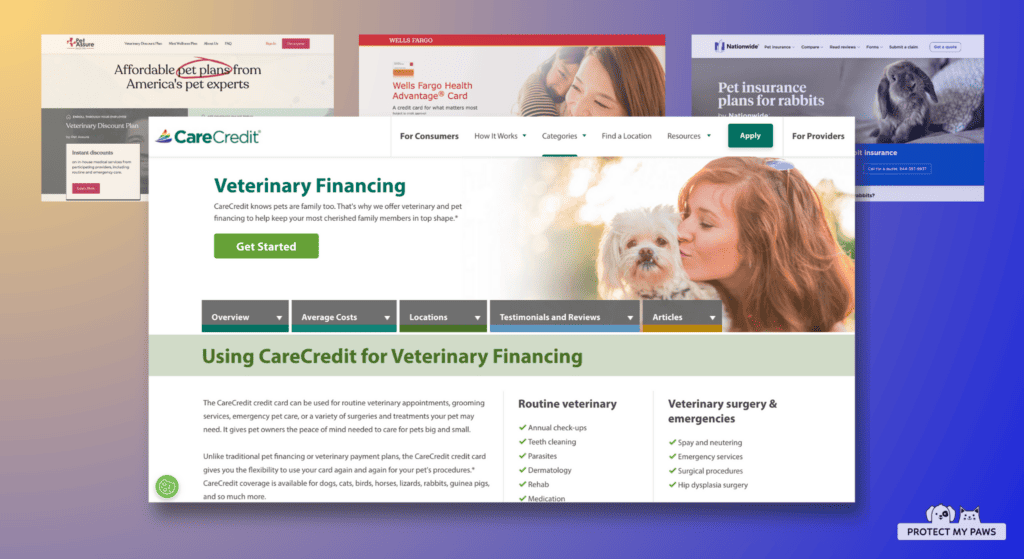
Unlike pet insurance, it does not cover expenses but can be used to pay for pet care at over 24,000 veterinary locations across the U.S. that accept it. As a budget-friendly solution to help manage veterinary costs, you can pay without adding the balance to your general-purpose credit cards.
The CareCredit card can be used for routine veterinary appointments, grooming services, emergency pet care, or various surgeries and treatments your pet may need, as long as they are part of their network.
The biggest draw of the card is the deferred interest deals that it offers. Pet parents can get 6 – 18 months of deferred interest on purchases of $200 or more. Each veterinary provider chooses what options to offer, so it is best to check first with yours.
| ⚠️ There’s also long-term financing for 24, 36, 48 or 60 months, but these aren’t 0% interest rate offers. And if it takes you longer than the promotional period to pay off your balance, interest is charged from the original purchase date. |
What We Really Like:
👍 Covers medical expenses for pre-existing and genetic conditions and a range of veterinary procedures, including annual check-ups, dental, medications and surgeries
👍 Can be used for pet meds in the pharmacies within CareCredit’s network and to buy prescribed food at the vet.
👍 $0 annual fee
👍 It’s a smart way to pay for unexpected and out-of-budget vet costs
What We Think Could Be Better:
👎 If you miss a payment or are late, you will get a high APR
👎 Not all veterinarians accept CareCredit as a payment option
| Customer Reviews “They constantly run promos with zero interest and tend to raise your limit on a regular basis has been my experience. I’ve always looked at Care Credit as an emergency situation for medical needs for your pet or yourself.” —LadyinLycra (Reddit) |
PLAN BREAKDOWN
| ProtectMyPaws rating: | ★★★☆☆ |
| Insurance type: | Credit card |
| Accident & Illness: | ✔️ |
| Dental: | ✔️ |
| Routine care (vaccinations etc): | ✔️ |
| Pre-existing conditions: | ✔️ |
| Age limits: | ❌ |
| Reimbursement time: | N/A |
| Cancellation policy: | N/A |
| Deductible: | N/A |
| Reimbursement rate: | N/A |
| Annual limit: | N/A |
4. Wells Fargo Health Advantage Card
Just like CardCredit, Wells Fargo Health Advantage is a medical credit card that can help you cover your pet’s wellness and emergency care expenses. Unlike general-purpose credit cards, the Wells Fargo Health Advantage credit card program offers flexible terms, special promotions, and competitive rates for veterinary costs. Plus, there are no deductibles to meet, claims to submit, nor preexisting conditions to worry about.
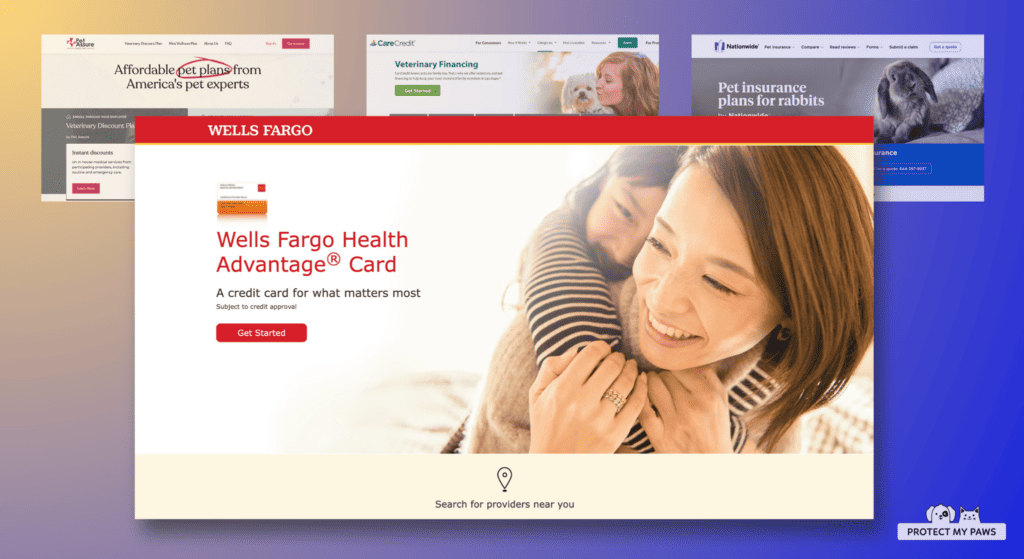
The Wells Fargo Health Advantage card can be used to finance any expense at the participating veterinary offices. The program offers a lower interest rate than other cards (with a maximum APR of 12.99%) and special promotions determined by enrolled providers. These promotions may include a 0% interest rate for low monthly payments over a specific period.
Additionally, the card helps you track your pet care costs separately from other credit card expenses.
The application process with Wells Fargo is fast, providing instant qualification confirmation. You can even apply for the program on the spot at your veterinarian’s office and receive instant approval based on your credit history.
What We Really Like:
👍 Can apply for a credit card at participating veterinary offices, which will process your application on-site
👍 Easy-to-understand monthly statements
👍 It is a revolving line of credit
👍 Wells Fargo is a trusted brand and has many decades of experience in financing
What We Think Could Be Better:
👎 There is no information online of enrolled providers
👎 There is limited upfront information regarding fees and individualized rates
| Customer Review “You can get approved real last minute. I literally got approved and my credit line determination while waiting in the ER for my cat” — D. (Reddit) |
PLAN BREAKDOWN
| ProtectMyPaws rating: | ★★★☆☆ |
| Insurance type: | Credit card |
| Accident & Illness: | ✔️ |
| Dental: | ✔️ |
| Routine care (vaccinations etc): | ✔️ |
| Pre-existing conditions: | ✔️ |
| Age limits: | ❌ |
| Reimbursement time: | N/A |
| Cancellation policy: | N/A |
| Deductible: | N/A |
| Reimbursement rate: | N/A |
| Annual limit: | N/A |
What to Look for When Buying Rabbit Insurance Plans
As veterinary medicine keeps evolving, pet care has seen significant improvements. However, upgrades come with a higher price tag. The advanced equipment, state-of-the-art facilities and professional skills of veterinarians to provide the best care for your pet can be quite costly.
| 🤔 Why Get Rabbit Insurance? Whether rabbit health insurance is right for you and your pet isn’t a one-size-fits-all decision. It’s worth discussing it with your vet and researching your options. Pet insurance might be more affordable than you think. While you might have a rough estimate of what you’d be willing to pay for unexpected vet bills, in life-or-death situations, you may be willing to stretch your budget beyond your imagination. That’s where insurance comes in to afford the best care for your beloved pet without fretting about the cost. Regarding rabbit insurance, however, the options are limited compared to those available for dogs and cats. But that doesn’t mean you can’t find the right coverage. It’s about considering the unique needs of your pet bunny and your financial situation. Consider any pre-existing conditions your rabbit may have, the coverage options in your area, and the offerings from the veterinary professionals you typically visit. Think of the level of coverage your pet may require, whether it’s for standard wellness care or comprehensive insurance that safeguards against unexpected situations. But most of all, before choosing a plan, ask all the questions you may have. You don’t want to get stuck with a policy that doesn’t meet your needs. Here are some things that can help you ask the right questions and find what best works for you. |
Navigating insurance plans and finding the best fit for you and your pet’s needs can be daunting.
However, these five key points can help you confidently tackle the options and ensure that your bunny has the best possible coverage.
1. Costs-value balance
Be sure to balance the cost of your monthly fee with the kind of coverage you want for your pet. While a low-cost plan may seem appealing, it may not provide sufficient coverage when your pet needs it most. Also, consider the benefits that suit you best, whether a discount-based plan or one that offers reimbursement.
Evaluate the reimbursement amount and the method you’ll receive, such as direct bank transfers (Nationwide) or platforms like PayPal or Venmo (Pet Assure). To understand the costs better, compare real quotes from different providers side-by-side.
2. Your pet’s current condition
While getting your pet insured when they are young, can be more cost-effective and offer broader coverage, it’s important to consider your pet’s current circumstances. If your rabbit has any preexisting conditions, traditional pet insurance is unlikely to cover them.
For example, Nationwide typically doesn’t cover pre-existing conditions unless cured and pet parents request coverage (which can be denied). Pet Assured or credit cards do not impose exclusions based on preexisting conditions, whether they are chronic or have been previously treated.
3. Coverage in your area
Some plans have a designated network of veterinary providers. You may be required to visit these specific vets or clinics rather than a professional of your choice. If you have a preferred veterinarian you trust and want to continue seeing, ensure they are included. Otherwise, check if other veterinarians are in your area within the network.
4. Waiting periods
Insurance providers, including Nationwide, have waiting periods, which are a specific amount of days (usually 14 days in their case) before your policy becomes effective. However, with options like Pet Assure and veterinary credit cards, you can use them immediately after enrollment
5. Possible combinations
You can combine different plans to maximize their benefits. For example, supplementing a pet insurance policy with a Pet Assure membership can provide coverage for pre-existing conditions and help save on routine care veterinary visits.
Another option is using the CareCredit credit card for immediate payment at the veterinarian’s office and filing a claim with your insurance provider to get reimbursed.
Common Questions About Insurance for Rabbits
🤔 Why do you need rabbit insurance?
Given their small size, you may think that bunnies’ veterinary costs will be fairly low. But this isn’t often the case. Unlike cats or dogs, rabbits need veterinarians who handle exotic pets; this specialized care often increases overall veterinary care expenses. Besides, rabbits are prey species skilled at concealing and hiding signs of illness.
This means they are often sicker than you initially thought when they finally see a vet! Rabbit illnesses can be complex and ongoing, requiring significant input from your caring veterinary team.
With rabbit pet insurance, you can have peace of mind, knowing you won’t have to break the bank if something unfortunate happens to your bunny. Pet insurance can significantly affect the cost of veterinary visits, whether it’s due to illness, injury, or an annual wellness exam.
🤔 What is the average vet bill for a rabbit?
Annual health exams are a smart way of keeping your bunny healthy and happy. Vets can identify signs of underlying illness before they worsen, saving you money on emergency veterinary expenses in the long run.
The cost of routine check-ups can vary depending on your location but typically range from $75 to $150. An emergency visit to the animal hospital can add up to approximately $300 to $500, covering the emergency appointment and necessary medications. For major surgical procedures requiring overnight stays at the clinic for recovery, costs can amount to around $2500.
You should also consider nurturing your pet bunny to avoid unwanted pregnancies and improve their health and well-being. Nurturing services can range from $300 to $600.
🤔 How much is rabbit insurance?
Nationwide offers a range of insurance plans for rabbits starting at about $21 monthly. However, the exact cost will depend on your chosen insurance plan, your rabbit’s health needs, pre-existing conditions, age and location. Alternatively, Pet Assured Wellness plans start at $18 monthly, with a flat rate, irrespective of your rabbit’s condition, age, or location.
🤔 What are the types of rabbit insurance?
When it comes to ensuring the well-being of rabbits and managing veterinary expenses, there are four types of coverage options available:
- Accidents and illness insurance plans: Designed to handle and cover accidents, injuries and medical expenses related to diseases.
- Wellness plans: Cover routine check-ups, vaccinations, bloodwork, lab tests, grooming, preventatives and dental care.
- Discount plans: To save up to 25% on veterinary care services.
- Financing: Vet credit cards provide a convenient option for unexpected expenses, allowing you to cover them without depleting your savings.
Wrapping Up
Although the options for rabbit insurance are currently limited, it’s still worth taking a closer look at what’s available. Understanding your options and what’s on the table will help you decide on the best insurance coverage for your bunny.
Even the smallest animals in our lives require some form of medical attention at some point. Purchasing pet insurance is a proactive step towards ensuring their well-being. While it’s fortunate that you never have to use your policy, the reality is that pets are living longer than ever, increasing the likelihood of needing insurance coverage.





